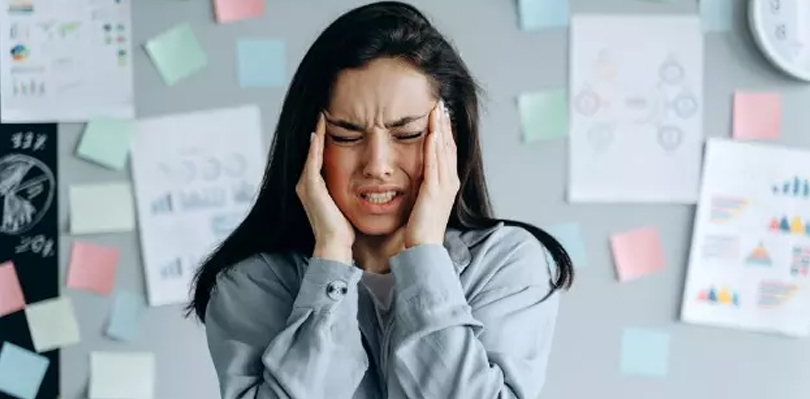In the fast-paced rhythm of modern life, chronic stress has become an all-too-common companion, sapping our energy, hindering our productivity, and affecting our overall well-being. But fret not, for amidst the challenges, there exists a realm of effective tools and techniques that empower us to rise above the clutches of chronic stress.
Join us on a transformative journey as we delve into the intricacies of conquering this modern menace. In this insightful blog post, we’ll unravel the science behind chronic stress, unveiling a treasure trove of actionable strategies. From mindfulness practices that soothe the mind to lifestyle adjustments that promote resilience, we’ll equip you with the knowledge and skills to regain control, foster tranquility, and embrace a life of balance and vitality.
What Is Chronic Stress
Chronic stress refers to an ongoing state of psychological and physiological tension that persists over an extended period. Unlike acute stress, which is temporary and often linked to immediate challenges, chronic stress lingers and can result from prolonged exposure to various stressors, such as work pressures, relationship issues, or financial difficulties.
This prolonged stress response can lead to a cascade of negative effects on physical and mental health, including elevated cortisol levels, impaired immune function, anxiety, depression, and even cardiovascular issues. Recognizing and managing chronic stress is crucial for maintaining overall well-being and preventing the potential long-term consequences it may bring.
How To Diagnose Chronic Stress

Diagnosing chronic stress can be complex, as it often involves a combination of self-assessment, clinical evaluation, and potentially, the use of medical tests to rule out other underlying conditions. Here are some details on how to diagnose chronic stress:
Self-Assessment And Symptom Recognition
- Physical Symptoms: Chronic stress can manifest physically with symptoms like frequent headaches, muscle tension, gastrointestinal issues, and changes in appetite and sleep patterns. Keeping a journal of these symptoms can be helpful.
- Emotional and Behavioral Changes: Chronic stress can lead to emotional symptoms such as irritability, anxiety, depression, mood swings, and increased use of substances like alcohol or tobacco.
- Cognitive Changes: Chronic stress can impair cognitive function, resulting in memory problems, difficulty concentrating, and a decreased ability to make decisions.
Consultation With Healthcare Professionals
- Primary Care Physician: Start by discussing your symptoms with your primary care physician. They can rule out other medical conditions that may be contributing to your symptoms.
- Mental Health Professional: A psychologist or psychiatrist can conduct a thorough assessment, including interviews and standardized questionnaires, to diagnose chronic stress or related disorders like Generalized Anxiety Disorder (GAD) or Post-Traumatic Stress Disorder (PTSD).
Psychological Assessments
- Stress Assessment Tools: There are various validated questionnaires and assessments, such as the Perceived Stress Scale (PSS) or the Holmes-Rahe Stress Inventory, which can help gauge stress levels.
- Structured Interviews: Mental health professionals may use structured interviews like the Clinician-Administered PTSD Scale (CAPS) to assess the severity and impact of stress-related symptoms.
Physical Examinations And Tests
- Laboratory Tests: These may be conducted to rule out other potential causes for your symptoms, such as thyroid disorders or hormonal imbalances.
- Neuroimaging: In some cases, brain scans like MRI or CT scans may be recommended to rule out neurological conditions if cognitive symptoms are severe.
Behavioral Observation
- Observation by a mental health professional: Sometimes, a mental health provider will observe your behavior and reactions during sessions to better understand your stress levels and triggers.
- Diagnostic Criteria: Healthcare professionals use diagnostic criteria from recognized manuals like the Diagnostic and Statistical Manual of Mental Disorders (DSM-5) to determine if a person meets the criteria for a stress-related disorder.
Remember that chronic stress is a complex condition, and its diagnosis often requires a comprehensive evaluation. If you suspect you are experiencing chronic stress, seeking help from a healthcare professional is essential to receive an accurate diagnosis and appropriate treatment.
How To Overcome Chronic Stress
Overcoming chronic stress requires a holistic approach that addresses the condition’s physical and psychological aspects. Here are some answers on how to overcome chronic stress:
Mindfulness And Relaxation Techniques
- Meditation: Regular meditation helps calm the mind, reduces anxiety, and promotes emotional resilience.
- Deep Breathing: Practicing deep breathing exercises can activate the body’s relaxation response, lowering stress hormone levels.
- Progressive Muscle Relaxation: This technique involves tensing and then releasing different muscle groups to promote physical relaxation and reduce tension.
Physical Activity
- Regular Exercise: Engaging in physical activities like walking, jogging, or yoga releases endorphins, which are natural mood enhancers.
- Aerobic Exercise: Cardiovascular exercises boost blood circulation and improve overall mood by reducing stress hormones.
Healthy Lifestyle Choices
- Balanced Diet: Consuming a diet rich in fruits, vegetables, whole grains, lean proteins, and healthy fats supports both physical and mental health.
- Adequate Sleep: Prioritize getting 7-9 hours of quality sleep each night to restore energy and improve stress resilience.
- Limit Stimulants: Reduce caffeine and alcohol intake, as they can exacerbate stress symptoms.
Time Management And Boundaries
- Prioritize Tasks: Create a to-do list and prioritize tasks to avoid feeling overwhelmed.
- Set Boundaries: Learn to say no when your plate is full and establish boundaries to prevent overextending yourself.
Social Support And Relationships
- Connect with Loved Ones: Spend time with friends and family who provide emotional support and a sense of belonging.
- Support Groups: Joining support groups or engaging in group activities can help you connect with others facing similar challenges.
Cognitive Behavioral Techniques
- Identify Negative Thought Patterns: Become aware of negative thought patterns and replace them with more realistic and positive thoughts.
- Problem-Solving: Break down problems into smaller, manageable steps to avoid feeling overwhelmed.
Relaxation Techniques
- Visualization: Imagine peaceful scenes or scenarios to promote relaxation and reduce stress.
- Listening to Music: Enjoying calming music can help lower heart rate and blood pressure.
Professional Help
- Therapy: Cognitive Behavioral Therapy (CBT) and other evidence-based therapies can help you manage stress by changing how you perceive and react to stressors.
- Medication: A mental health professional may sometimes recommend medications to manage symptoms.
Hobbies And Creative Outlets
- Engage in Enjoyable Activities: Pursue hobbies and interests that bring joy and distract from stressors.
- Artistic Expression: Engaging in creative activities like painting, writing, or playing music can be therapeutic.
Time For Self-Care
- Regular Breaks: Take short breaks throughout the day to relax and recharge.
- Pampering: Treat yourself to activities you enjoy, such as taking a bath, reading a book, or spending time in nature.
Remember that overcoming chronic stress is a gradual process that requires patience and consistency. Experiment with different strategies and techniques to find what works best for you, and consider seeking guidance from healthcare professionals if your stress levels are severely impacting your daily life.
Effective Tools And Techniques To Overcome Chronic Stress
Mindfulness And Meditation
Mindfulness involves cultivating awareness of the present moment without judgment. Regular meditation sessions, even as short as 5-10 minutes a day, can significantly reduce chronic stress. Focus on your breath, bodily sensations, or a calming mantra. This practice rewires the brain to respond to stressors more calmly, fostering emotional regulation and a greater sense of control.
Cognitive Behavioral Therapy (CBT)
CBT is a structured psychotherapy that helps identify and challenge negative thought patterns driving chronic stress. A therapist guides you to reframe thoughts and replace them with more balanced and rational perspectives. This empowers you to manage stressors by altering your reactions, reducing anxiety, and enhancing problem-solving skills.
Progressive Muscle Relaxation (PMR)
PMR involves tensing and then relaxing different muscle groups, promoting physical relaxation and reducing stress-induced tension. Practice this technique regularly to enhance your body’s relaxation response and alleviate physical symptoms like muscle pain or headaches.
Regular Physical Exercise
Engaging in regular physical activity, such as jogging, swimming, or yoga, releases endorphins, which act as natural stress relievers. Exercise also improves blood circulation, reduces muscle tension, and enhances overall mood, providing a holistic approach to managing chronic stress.
Time Management And Prioritization
Learn to manage time effectively by breaking tasks into smaller, manageable segments. Set realistic goals and prioritize tasks based on importance. By organizing your day, you’ll reduce the sense of being overwhelmed and create space for relaxation and self-care.
Social Support And Connection
Cultivate meaningful connections with friends, family, or support groups. Sharing your feelings and experiences with others can provide emotional relief and remind you that you’re not alone in your struggles. Engaging in social activities also offers a distraction from stressors and fosters a sense of belonging.
Remember that overcoming chronic stress is a personalized journey, and combining multiple techniques often yields the best results. Experiment with these tools to discover which ones resonate with you, and consider seeking guidance from mental health professionals for a tailored approach to managing your specific stressors.
FAQ
What are some quick and effective techniques to alleviate stress during a busy day?
When time is limited, you can try deep breathing exercises, such as the 4-7-8 technique: inhale for 4 seconds, hold for 7 seconds, and exhale for 8 seconds. Another option is mindfulness, where you focus your attention on your senses for a few moments, grounding yourself in the present. Additionally, take short breaks to stretch or walk around, which can help release physical tension and clear your mind.
Can chronic stress affect physical health, and how can I address its impact?
Yes, chronic stress can lead to physical health issues like high blood pressure, weakened immune systems, and digestive problems. To address its impact, consider incorporating regular exercise into your routine to reduce stress hormones and boost immunity. Prioritize a balanced diet with whole foods and stay hydrated. Adequate sleep and relaxation techniques like meditation can also support your body’s recovery.
Are there any long-term benefits of managing chronic stress beyond immediate relief?
Absolutely. Managing chronic stress not only provides immediate relief but also offers long-term benefits. Improved stress management can enhance overall well-being, lower the risk of stress-related chronic diseases, and help prevent burnout. Developing effective coping skills equips you to handle future stressors more resiliently, enhancing your emotional intelligence and overall quality of life. It can also positively impact relationships and productivity, creating a more balanced and fulfilling lifestyle.

